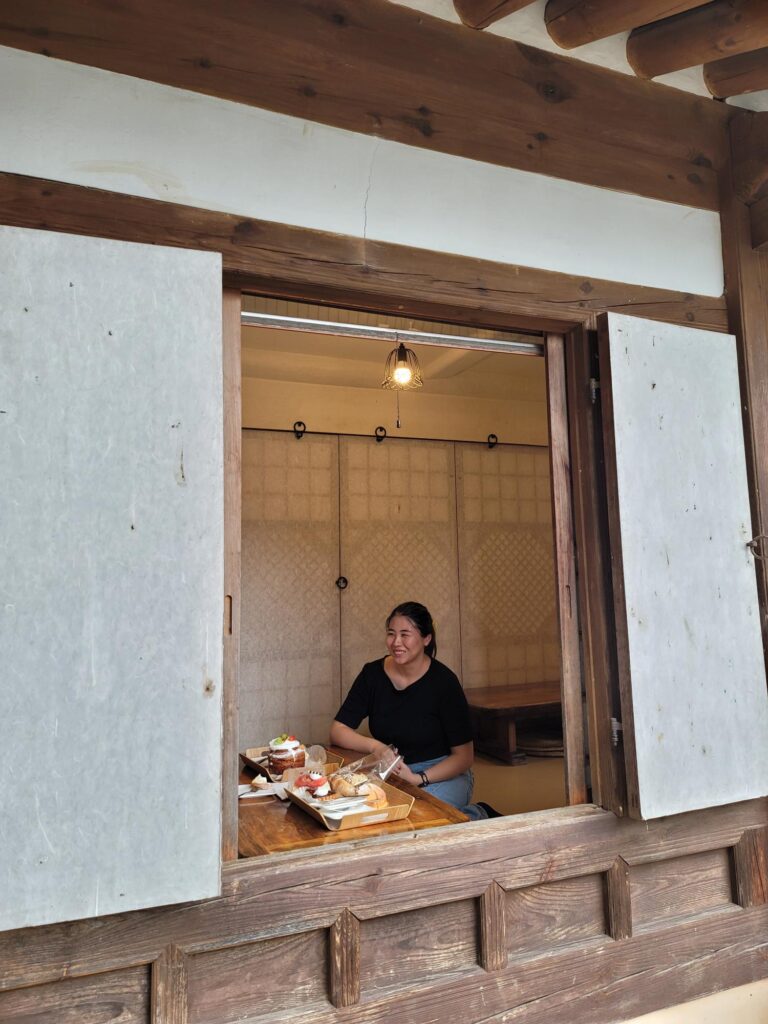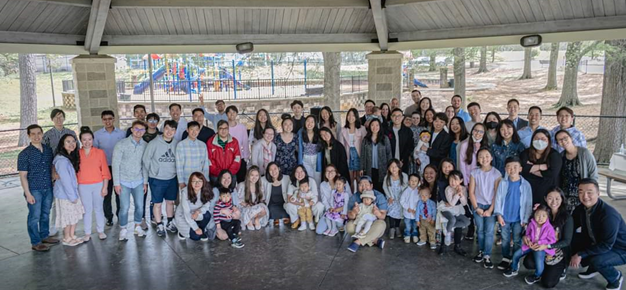Chuseok is a mid-Autumn harvest festival, also considered the Korean Thanksgiving Day, where people return to their hometowns to celebrate with family. Chuseok falls on different dates every year and is based on the lunar calendar, with it being celebrated from September 9th–12th of this year. Typically, a table of Korean dishes, including fruit and rice cakes called ddeok and songpyeon, is prepared as part of the ancestral memorial ceremony called charye, during which the family takes turns bowing to their ancestors at the family home. Another Chuseok tradition is to bring gifts when visiting family. A popular gift amongst many households is a Spam gift set. Spam became a popular commodity introduced by the US military during the Korean War and has remained a staple since.
This month, we spoke to Atlanta Consultant Christine Lee about how she celebrates Chuseok, her experiences at SEI in her first few months, and what drew her to consulting. She is a Data & Analytics (D&A) Consultant with seven years of industry experience. She has had the opportunity to work in different industries, allowing her to work with multiple facets of Data & Analytics including predictive analytics, business intelligence, data science, KPI reporting, database and pipeline management, and construction.
Can you tell me a little bit about yourself?
I am a Korean American, born and raised in Georgia. I’m from a small town named Macon and graduated with a Bachelor’s degree from Emory University. My focus of work is in the Data and Analytics (D&A) space in supply chain, transportation, retail, and labor analytics. Besides that, I love to bake and travel, and I also teach at Sunday school for middle schoolers. One of my biggest interests — and the most fulfilling — is ‘untigering,’ where I coach kids to manage expectations and create healthy boundaries to help them find their own identity outside the expectations of immigrant family dynamics.

Coming from retail and big tech, especially in the Data and Analytics space, what drew you to consulting?
I was always interested in consulting and could see my career path organically moving to it. The aspect of having different client problems to bring a solution to, as well as learning to adapt my approach and learning new technology, drew me to consulting. SEI reached out to me on LinkedIn, and I was more than interested in applying. The interview process answered many of my questions, confirmed that consulting was something I still desired to do, and illuminated how special SEI is. The diversity of my interviewers and their transparency proved the authenticity of SEI being a firm built by consultants for consultants. With each interview, I was more impressed and motivated to succeed and join the SEI team.
The advantage of working in D&A as a consultant is the ability to leverage my D&A skills and perform in different roles, such as a Program/Project Manager to Business Analyst. SEI allows me to not only flex into various roles to improve my business skills, but also provide value to clients with my technical knowledge.
How has SEI helped you in your transition into consulting?
Coming from Industry into Consulting, I initially suffered from imposter syndrome, but the Atlanta office welcomed me with open arms. They walked me through my client engagement in the first few months and made me comfortable asking questions. I love that the SEI has a collaborative culture. The firm genuinely wants its team to perform well both together and individually. I’ve seen this with all the LOCs I’ve interacted with and firsthand in the Atlanta office.
The Atlanta office has given me the confidence to leverage my skill set in SQL and AWS, and the tools necessary to reach the next level with Python and R. In the last five months, I have been challenged on my normal approaches and urged to think differently. I am surrounded by people who are hungry to improve themselves and can identify opportunities where companies want to be data-driven. Since joining SEI, I have been emboldened to have a voice — both in the firm and with my client — while being mentored by and collaborating with impressive and kind teammates.

What have you loved the most about SEI since you joined? What are you most looking forward to in the D&A space with SEI?
There is an equal playing field at SEI regardless of tenure. I feel comfortable getting to know fellow consultants and freely asking questions to better myself as a D&A consultant. I look forward to working with clients who want to enhance their D&A journey and be more data-driven. My bigger goal is to promote knowledge sharing, so the D&A team can help other Communities of Practice at SEI to be more tech-savvy and support their understanding of solving technical issues for clients. As we continue to grow, this would enable SEI to build a better knowledge library for everyone in this changing world of business.
What are you looking forward to regarding DE&I, especially at SEI?
I look forward to shedding light on the Asian experience during the pandemic. For any company to truly pursue DE&I with the best intentions, it must be inclusive of all backgrounds. DE&I efforts at any level of the organization gain momentum when teams are inclusive. Most conversations about the pandemic don’t include the Asian hate crimes happening in the US. It is especially impactful since people continue to talk about the pandemic without acknowledging the experiences of their Asian American colleagues. From the increased racism and hate crimes targeted at our vulnerable elderly to the Atlanta Massage Parlor shooting, the pandemic is a heavy topic because it hasn’t been something the Asian community has bounced back from yet. These are barriers I can’t control yet impact my daily life personally and at work. For me, the pandemic was a reminder of my prior experiences with racism, like daily interactions where people were unsure of how to interact with me or if I was American-born or accustomed. No matter what, I always seek to be respected and seen as a fellow peer.

At SEI, my colleagues have been open, receptive, and active listeners in how we can continue to improve our sense of belonging. After my orientation, it has made me appreciate the company and the Atlanta office even more. Our Managing Director ensures that DE&I is an integral part of the office, not an afterthought. I am grateful that my colleagues also take the initiative to listen, ask questions, and educate themselves on the Asian American experience.
Coming from a big company with established Employee Resource Groups, how do you think we at SEI can bring Korean holidays, like Chuseok, into a bigger light? How do you usually celebrate Chuseok?
It’s great that SEI has started spotlighting holidays and adding them to LOC calendars. We can improve by focusing on explaining the holiday, sending out communications associated with it, and working on incorporating celebrations in physical offices. On a larger scale, we should continue supporting our communities, not just locally but globally, where possible. For example, we have SEIers from different parts of the world or have loved ones in other countries who are impacted when global events like the pandemic happen.
Normally, Chuseok is a three-day harvest holiday to celebrate the transition of seasons from summer to fall, to pay our respects to our family, and most importantly, to enjoy a meal and bond with family. As a Korean American, I typically celebrate the holiday with my parents by having a simple meal in my hometown, Macon, or at a Korean restaurant in Atlanta. My family and I partake in eating more rice cake that we buy from local Korean restaurants. Currently, Korean families are trying to update the holiday traditions to lessen the burden and work and truly enjoy the holiday. Overall, we celebrate the Chuseok holiday to bring us together as a family and celebrate our past and the agricultural background integral to Korean food, culture, and history.



